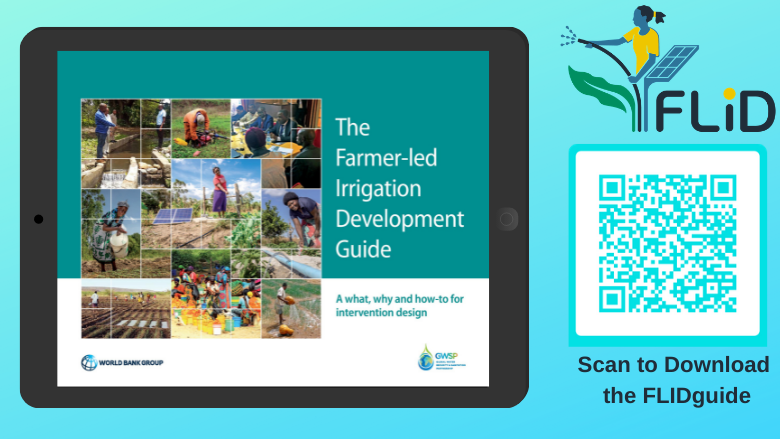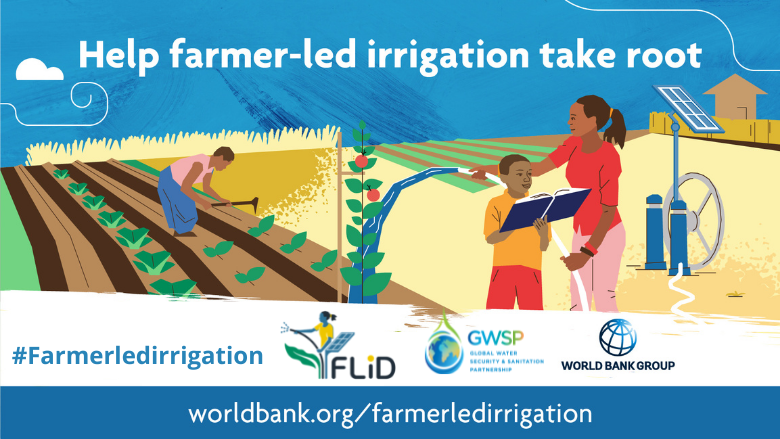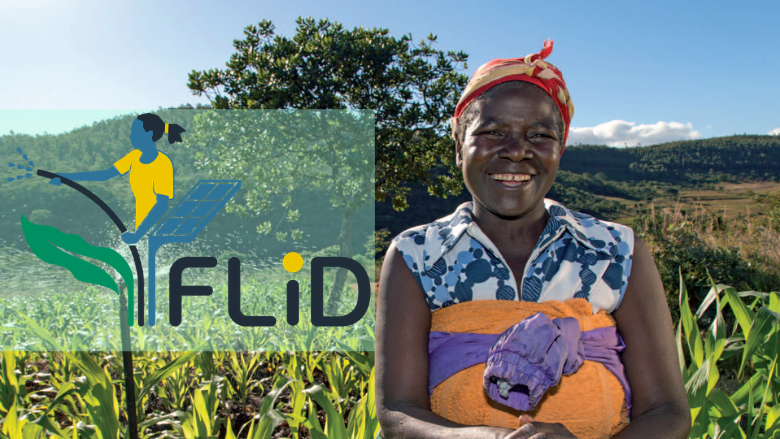Farmer-led Irrigation Development (FLID) is the process where farmers, alone or as a collective, take the lead in the establishment, improvement, or expansion of irrigated agriculture. Characteristically, farmers who autonomously develop irrigation are entrepreneurial innovators, targeting new markets and investing their own resources. They develop technologies, make investments, and create market linkages. These farmers experience quick returns on their efforts, often against all odds. However, many more farmers could benefit from improved agricultural water use practices. Many smallholder farmers remain constrained by unfavorable conditions that slow their growth. They face hurdles which elevate risks and increase both financial and transaction costs.
Governments and development partners are increasingly aware of the massive areas involved and the potential gains that FLID can bring. Although FLID is commonly characterized by smallholder farmers, it does have a small impact. While individual farms are mostly small, they occur in such massive numbers that, collectively, they have large impacts on food production, the economy, and their surrounding landscapes.
It makes sense for Governments to catalyze farmers’ own initiatives. Indeed, FLID:
Fast-tracks irrigation at a larger scale;
Enhances diversity and inclusion, with particular reference to gender;
Supports sustainability, economic growth, and poverty reduction;
Increases resilience to climate shocks and stressors, as well as disasters such as COVID-19;
Holds significant potential for short-term recovery for the most vulnerable farmers;
Helps safeguard domestic food security in the long term; and
Strengthen farmers’ ability to recover from shocks and adapt to a changing environment.
The FLID Initiative at the World Bank delves into the challenges of feeding a growing population, improving nutrition, adapting to the impacts of climate change, and reducing global poverty. In addition to the benefits listed above, FLID has potential to make substantive contributions to the attainment of many of the Sustainable Development Goals – particularly Goal 1: No poverty, Goal 2: Zero hunger, and Goal 3: Health.

About the FLID Guide
FLID requires a new frame of mind, new modes of engagement, new ways of learning, new technologies, new partnerships, and new tools. This is why the Farmer-led Irrigation Development Guide: A what, why and how-to for intervention design is an indispensable resource pack for government teams and development partners working in the agricultural, water, and irrigation sector. The FLIDguide has been created as a practical tool to help shape a new way of engaging in irrigation development. The guide can be used for many purposes, including but not limited to:
Carrying out a rapid diagnostic
Guiding debate on outcomes with key stakeholders
Identifying critical and catalytic interventions and packaging these interventions into an operation.
The FLIDguide consolidates a wealth of knowledge on the topic and hopes to inspire informed action so that FLID continues to take root as a major driver of positive, inclusive, and sustainable change. And, importantly, improves the lives of millions of small-scale farmers.
Download the complete FLID guide here
Blogs:
Farmer-led irrigation: the what, why, and how-to guide (March 22, 2021)
A quiet revolution in irrigation offers a key to recovery (July 1, 2020)
Innovation, entrepreneurship, and inclusion: our continued efforts to demonstrate the power of farmer-led irrigation (October 21, 2019)
Ensuring a water-secure future through farmer-led irrigation (February 20, 2018)
Brochures:
Videos:
The FLIDguide (English) | Guide du développement de l'irrigation piloté par les agriculteurs (French)
FLID in Uganda - How the Government of Uganda Is catalyzing the FLID process at scale
Do you want to know more about FLID? Please contact
Senior Water Economist Regassa Namara at rnamara@worldbank.org
Senior Irrigation and Drainage Specialist Gabriella Izzi at gizzi@worldbank.org
Senior Water Resources Management Specialist Joy Busolo at jbusolo@worldbank.org
Senior Operations Officer Richard Colback at rcolback@ifc.org

